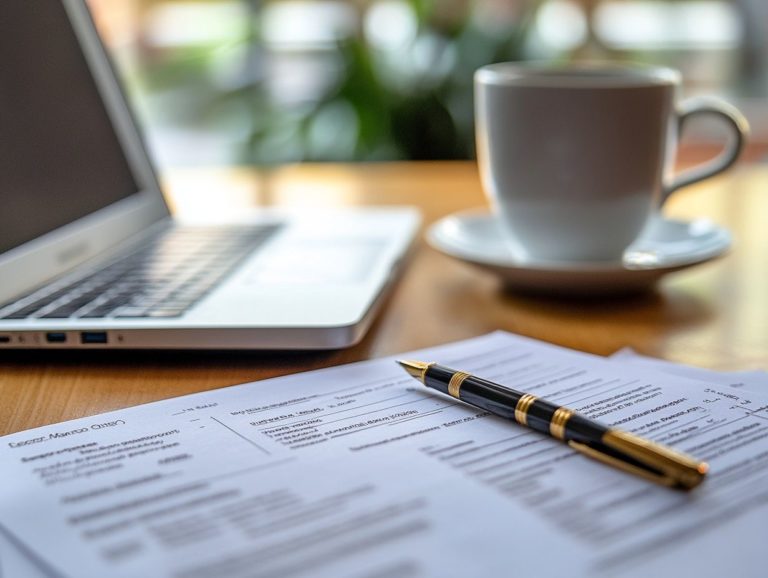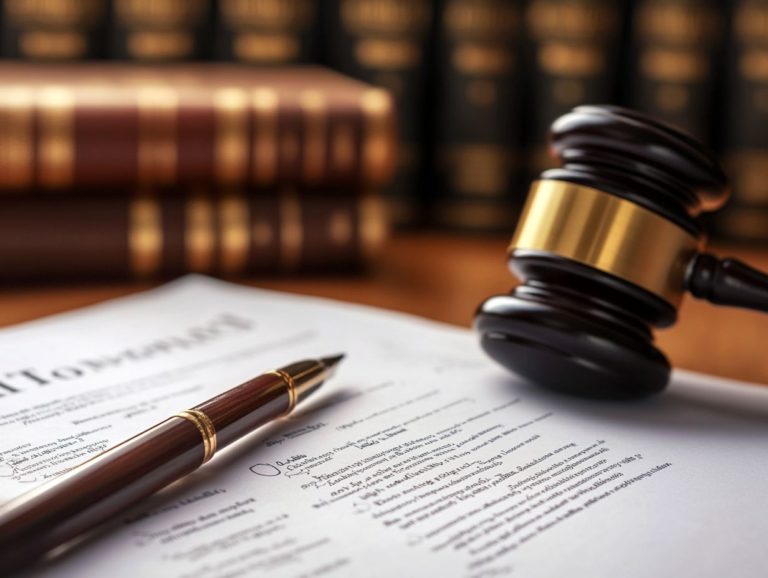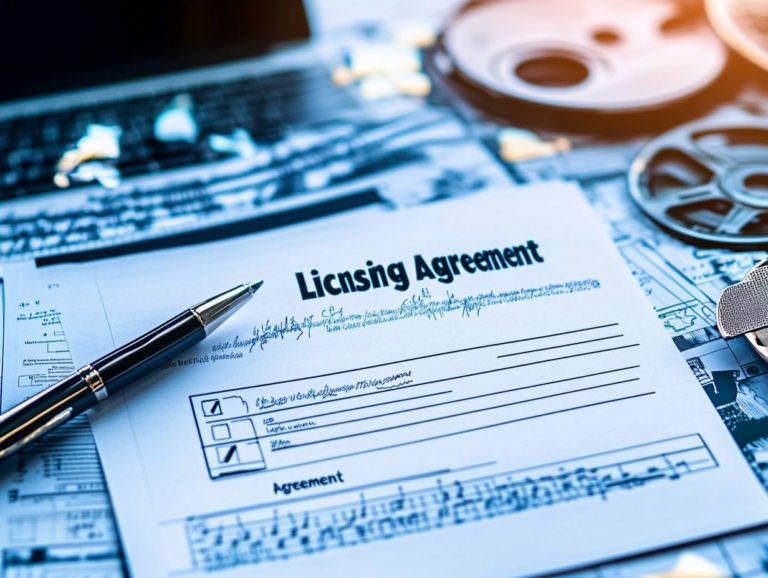How to Resolve Disputes in Licensing Agreements
Licensing agreements play a crucial role in numerous industries, enabling parties to share intellectual property while safeguarding their respective interests.
However, disputes can emerge, leading to tension and uncertainty. Let s dive into the common disputes you might face in licensing agreements, examining their causes and various resolution methods available.
From effective negotiation and mediation to arbitration, and ultimately, legal action as a last resort, this article offers strategies to navigate these challenges with finesse. Grasping these processes can help you protect your rights and cultivate positive relationships in your agreements.
Contents
- Key Takeaways:
- Common Disputes in Licensing Agreements
- Resolving Disputes through Negotiation
- Mediation as a Dispute Resolution Option
- Arbitration as a Dispute Resolution Option
- Legal Action as a Last Resort
- Frequently Asked Questions
- What is a licensing agreement?
- What are the common disputes that may arise in licensing agreements?
- How can disputes in licensing agreements be resolved?
- What steps should be taken before entering into a licensing agreement to avoid disputes?
- Can disputes in licensing agreements be prevented?
- What happens if a dispute cannot be resolved?
Key Takeaways:

Effective communication and compromise are key in resolving disputes in licensing agreements through negotiation. Mediation can be a beneficial and cost-effective option for resolving disputes in licensing agreements, with a neutral third party helping the process along. Arbitration is a way to settle disputes formally and is usually final, but it is important to weigh the pros and cons before choosing this option.
Resolving disputes quickly is crucial for your success don t wait until it s too late!
What is a Licensing Agreement?
A licensing agreement is essentially a legal contract between two parties the licensor and the licensee. In this arrangement, the licensor grants you permission to use specific intellectual property, like trademarks, copyrights, or patents, under clearly defined terms. This contract is vital for establishing the rights and obligations of both sides, ensuring that the intellectual property remains protected while you benefit from its use.
These agreements serve many purposes, such as enabling businesses like yours to expand product lines without incurring the hefty costs of development or marketing. They also allow creators to monetize their work by giving you access to their intellectual property.
Licensing agreements can be categorized into exclusive and non-exclusive licenses. An exclusive license means only you can use the property. A non-exclusive license means others can use it too.
The significance of these agreements lies in their ability to safeguard creators’ rights breaking these contracts can result in serious legal issues. For instance, if a software company allows limited use of its program, they may terminate your access if you fail to meet the agreed conditions.
Both licensors and licensees, including you, must thoroughly understand their responsibilities to prevent disputes.
Common Disputes in Licensing Agreements
Licensing agreements frequently give rise to common disputes stemming from breach of contract, copyright or trademark infringement, and disagreements over royalty payments. These disputes can have a big impact on the business relationships between licensors and licensees, often resulting in expensive legal battles or protracted negotiations that drain both time and resources.
Types of Disputes and Causes
Licensing agreements can lead to many types of disputes. Often, these conflicts arise from misunderstandings or misaligned expectations regarding the contract terms. For instance, you could face issues over fair use, particularly if you believe you re entitled to use licensed materials for purposes that aren t explicitly covered in the agreement.
Complications can also emerge between non-exclusive and exclusive use rights; you may inadvertently overstep your granted permissions, which can lead to conflicts with the licensor’s intentions.
Additional causes of concern might include issues surrounding royalty payments, territory clauses, and the defined scope of usage in the license. These disputes don t just impact your financial obligations they can also infringe upon the rights established for the licensor. Ultimately, this can reshape the dynamics of your agreement and potentially result in costly litigation.
Understanding these agreements empowers you to protect your interests be proactive in your licensing journey!
Resolving Disputes through Negotiation

Resolving disputes through negotiation stands out as one of the most effective strategies available to you. This approach not only facilitates meaningful communication but also gives you the power to employ various negotiation tactics aimed at achieving an amicable solution.
By concentrating on the interests of all parties and remaining receptive to creative concessions, you can sidestep the pitfalls of lengthy litigation while simultaneously preserving vital business relationships.
Effective Communication and Compromise
Effective communication plays an important role in the negotiation process. It fosters understanding and paves the way for compromise in licensing disputes.
By employing strategic negotiation techniques and emphasizing collaborative problem-solving, you can deftly navigate differences and work toward solutions that benefit everyone involved. Stay attuned to cultural nuances.
Consider using techniques like active listening. Showing genuine interest in the other party’s perspective can significantly enhance the quality of discussions.
For example, when negotiating licensing agreements across cultures, being aware of non-verbal cues can help you avoid misunderstandings that stem from differing communication styles.
Establishing common ground through shared examples or mutual goals can help cultivate a positive atmosphere. By being aware of cultural subtleties, such as local customs and negotiation etiquette, you create a more respectful dialogue. This sensitivity can lead to successful compromises, as all parties feel valued and understood, ultimately resulting in agreements that provide satisfaction for everyone involved.
Mediation as a Dispute Resolution Option
Mediation stands as an exceptional option for resolving disputes, offering an equitable remedy for those navigating licensing disagreements in a confidential environment.
A neutral mediator facilitates dialogue between you and the other party to find common ground. In doing so, mediation fosters collaboration and enhances mutual understanding for a more harmonious resolution.
Benefits and Process of Mediation
The benefits of mediation in dispute resolution are numerous. It offers a cost-effective, swift, and equitable approach, making it a preferred choice for resolving licensing disputes. The mediation process facilitates structured discussions led by a trained mediator, helping you navigate your issues while ensuring confidentiality.
Choose mediation now to save time and money while protecting your business relationships! Mediation typically unfolds in several steps:
- The mediator first meets with each party individually to grasp their perspectives.
- A joint session is then held for open discussion of the issues at hand.
- Finally, brainstorming sessions take place to explore potential solutions.
Throughout this process, confidentiality is paramount. It encourages candid communication without the fear of repercussions, ultimately leading to more satisfactory and enduring agreements. This unique aspect of mediation protects sensitive information and builds trust between the parties involved.
Arbitration as a Dispute Resolution Option

Arbitration serves as an alternative dispute resolution method that presents both advantages and drawbacks in the realm of licensing disagreements.
While it can facilitate a quicker resolution compared to traditional litigation, you must carefully consider the potential costs involved, such as attorney fees, as well as the irrevocability of arbitration decisions against the benefits it provides.
Pros and Cons of Arbitration
Imagine resolving your disputes quickly and efficiently arbitration can make that happen! The advantages of arbitration are clear: it offers a quicker resolution and enhanced flexibility during the dispute resolution process.
However, there are also drawbacks, such as the potential for limited appeals and the possibility of higher costs linked to legal strategies. Understanding these dynamics is essential for anyone contemplating arbitration to resolve licensing disputes.
As licensors and licensees weigh their options, they often realize that arbitration can streamline proceedings. This leads to faster outcomes and significantly less time spent in hearings compared to traditional litigation.
Consider a technology licensor facing a dispute over product specifications. By choosing arbitration, both parties can tailor the process to their needs, selecting arbitrators with the right industry expertise to navigate the complexities of the case effectively.
On the flip side, this choice might limit their ability to appeal a decision, raising concerns if the outcome feels unjust. Mediation offers a more collaborative approach, allowing both sides to negotiate and retain some control over the resolution. However, it lacks the binding authority that arbitration provides.
By carefully evaluating these factors, you can choose the most suitable path for your specific circumstances.
Legal Action as a Last Resort
When you ve explored every other avenue for dispute resolution, legal action becomes your last resort in licensing disputes. This is especially true in situations involving breach of contract or the pursuit of monetary damages or injunctive relief.
Starting a lawsuit can incur substantial costs and create complications that may strain your business relationships.
When to Consider Legal Action
When breaches occur, it s time to take action don t let negligence impact your business! Legal action should be on your radar when you encounter significant breaches of contract in licensing disputes that mediation or arbitration can t resolve.
Such breaches can lead to statutory damages and directly impact your core interests. When the stakes are high and your business relationships hang in the balance, pursuing legal recourse might just be your best or only option.
Look for key indicators that it s time to act, such as the severity of the breach and potential long-term consequences for you and your business. If the breach threatens the value of your licensed content or leads to notable financial losses, it s a clear signal that legal intervention is necessary.
Statutory damages can serve as a strong incentive for parties to adhere to agreements. It’s crucial for you to document all communications meticulously. Keeping thorough records not only bolsters your claims but also paints a compelling picture of your efforts to resolve issues amicably, ultimately strengthening your case for legal action if it comes to that.
Frequently Asked Questions

What is a licensing agreement?
A licensing agreement is a contract where one party lets another use its intellectual property like patents or trademarks for a set time.
What are the common disputes that may arise in licensing agreements?
- Breach of contract: one party fails to meet the terms of the agreement.
- Copyright or trademark infringement.
- Failure to pay royalties.
- Disagreement over the scope of the licensed rights.
How can disputes in licensing agreements be resolved?
- Negotiation and mediation: both parties try to reach a mutual agreement.
- Arbitration: a neutral third party makes a decision on the dispute.
- Litigation: involves taking the dispute to court.
What steps should be taken before entering into a licensing agreement to avoid disputes?
Before entering into a licensing agreement, it is important to thoroughly review the terms and conditions. Clarify any ambiguous language and ensure that all parties have a clear understanding of their rights and obligations. Consulting with a lawyer to review the agreement may also be helpful.
Can disputes in licensing agreements be prevented?
Preventing all disputes is challenging. However, including specific clauses in licensing agreements can help address potential issues and outline how to resolve trademark disputes amicably.
Open communication is key. Both parties should maintain clear and honest discussions throughout the process.
What happens if a dispute cannot be resolved?
If negotiation or mediation fails, the next step may be court action. This can be a long and costly process, so it’s crucial to explore all other options first.






